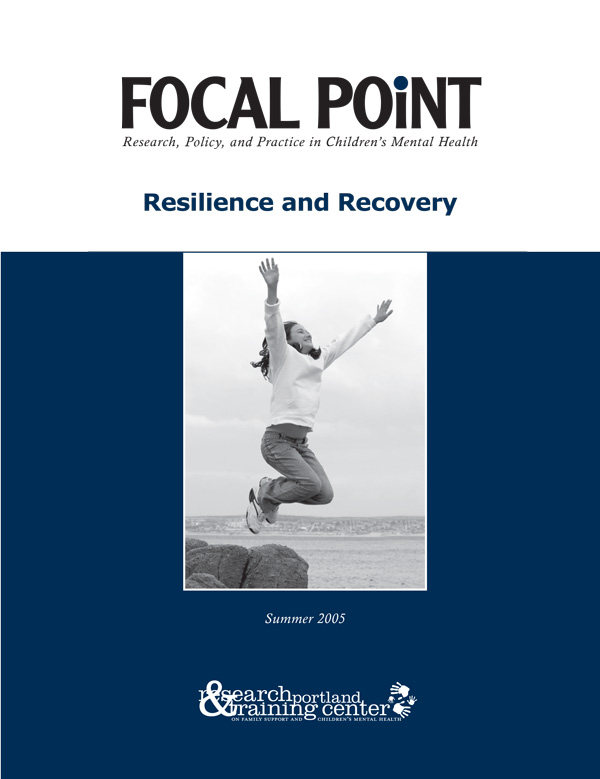Focal Point Summer 2005

"Resilience and Recovery" (2005), v.19(1)
This issue of Focal Point examines the concepts of resilience and recovery and what they mean in the context of mental health care for children and adolescents. A resilience-and-recovery perspective highlights new ideas and strategies for transforming mental health care for children and adolescents.
Access Articles in this Issue
-
Resilience and Recovery
Walker, J. S. & Friesen, B. J.
This article argues that a resilience–and–recovery perspective highlights new ideas and strategies for transforming mental health care for children and adolescents. In particular, it draws attention to the importance of strategies that build hope and connectedness, and that offer opportunities for young people to develop skills and talents.
-
The Concept of Recovery: "Value Added" for the Children's Mental Health Field?
Friesen, B. J.
What can the concept of recovery add to system of care principles and the emphasis on promoting resilience already operating in the children's mental health field? One answer to this question is an increased focus on hope, optimism, and a positive orientation toward the future. But stakeholders caution that the concept for recovery, as developed within the adult mental health field, cannot be imported "as is" into the children's mental health field.
-
My Path to Recovery
Green, M.
A young woman describes her own perspective on, and experience with, recovery from serious mental illness.
-
Resilience and Recovery: Findings from the Kauai Longitudinal Study
Werner, E.
The Kauai Longitudinal Study monitored the development of a cohort of children at intervals from birth to 40 years of age, focusing on risk and protective factors and how these related to successful life outcomes. One key finding is that the same factors that promote resilience in at–risk children and youth also promote recovery in young adults who had experienced difficulties. In particular, supportive relationships with caregivers, extended family, and community members were associated with both resilience and recovery.
-
Building Hope for Adolescents: The Importance of a Secure Social Base
Shorey, H. S. & Snyder, C. R.
This article describes the key role that a hopeful outlook plays in adolescents' successful transition to adulthood. The authors also describe the intervention they have developed for increasing hopefulness.
-
Surviving the System
Nelson, A.
A young woman describes her experiences with "the system" including years spent in psychiatric institutions and group homes. She argues that the "help" she received actually caused harm, but that a different approach to services could have benefited her.
-
Supporting Recovery for Older Children and Adolescents
Huffine, C.
This article describes how clinical work with children and adolescents can be done in a way that supports recovery and promotes healthy development.
-
Resilience and Recovery: Changing Perspectives and Policy in Ohio
Walker, J. S.
This article describes how advocates in Ohio convinced their state department of mental health, and the legislature, to reorient services around resilience and recovery concepts.
-
Developmental Assets and the Promotion of Positive Development: Findings From Search Institute Data
Theokas, C., Lerner R. M., & Phelps, E
This article uses data from the Search Institute to show that youth with higher levels of developmental assets exhibit more thriving behaviors and fewer risk behaviors. Discussion focuses on how community assets and individual assets work together to promote thriving.